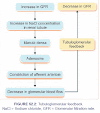Introduction:
Alpha blockers are drugs that show their pharmacological actions by Mechanism of blocking alpha receptors and thus nullify the agonistic effect of cathecolamines etc.depending upon their specificity for alpha I and alpha II receptors, their classification is as:selective alpha I and non selective alpha I+II blockers.
ALPHA BLOCKERS - CLASSIFICATION
alpha blockers are classified on the basis of their receptors selectivity into following sub classes.
- selective alpha I blocker
- non selective alpha I + alpha II blocker
selective alpha I blockers
selective alpha I blockers are drugs showing their pharmacological antagonism only in alpha I receptors.
following drugs are included in this class
- indoramine
- alfuzosin
- terazosin
- prazosin
- indoramine
- doxazosin
- urapidil
non selective alpha blockers
as their name indicate non selective alpha blockers show their pharmacological antagonism action on both types of alpha receptors.non selective alpha blockers include the following two drugs.
- phenoxybenzamine
- phentolamine
the hiarchy tree of alpha blockers meet the parent class antihypertensive drugs in the following ssequence
alpha blockers...adrenoceptor antagonists...sympatholytics...antihypertensive...cardiovascular drugs.
Mechanism Of Action:
the mechanism of action of alpha blockers is illustrated in the sketch below.
 |
| alpha blockers mechanism |
catecholamines,adrenaline and nor adrenaline etc are the natural substances found in the body that serves as agonists for alpha receptors(alpha I mentioned here).their pharmacological action on alpha receptor maintain sympathetic tone throughout the body.
the physiological response that results thereof, is vasoconstriction that leads to maintaining blood pressure at a high level i.e 120/80 (this is a normal physiological mechanism) however when there is some kind of pathological condition due to which agonistic secretions of the body are in abnormal amount or there is some reason else,we can trim down this mechanism for controlling high blood pressure.
alpha blockers play their role through pharmacological antagonistic mechanism.alpha blockers,like alpha agonists also have affinity for active sites on alpha receptors therefore they compete for alpha receptors, leaving less alpha receptors prone for agonistic activity.the physiological responses that results are vasodilation, less peripheral vascular resistance and a decreased blood pressure.
Clinical Applications Of Alpha Adrenergic Blockers:
Following are some well known clinical applications of alpha blockers.
- used in mild to moderate hypertension.
- used for benign prostrate hypertrophy.
- used in pheochromocytoma (tumor of adrenal medulla in which there is high secretion of adrenaline and nor adrenaline
- during surgery (phentolamines quick action, short period of action, reversible) ,and before surgery (phenoxybenzamines longer period of action, irreversible).
- in congestive cardiac failure.
- phentolamines is also used in hypertensive crisis caused ny clonidine withdrawl.
- used in sexual and erectile dysfunction.
Side Effects Of Alpha Blockers:
following are some side effects associated with persistant use of alpha blockers.
- orthostatic hypotension
- postural hypotension
- first dose phenomenon
- reflex syncope (too much low blood pressure on first use).
- nasal stiffness/nasal congesion.
- tachecardia,tremors,cardiac arrhythmia.
- ischemia,angina(due to high cardiac activity).



